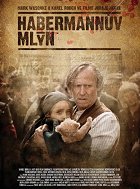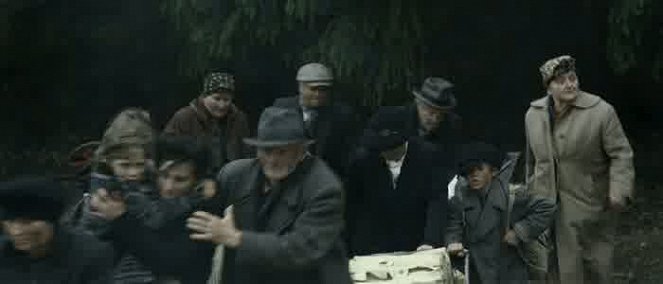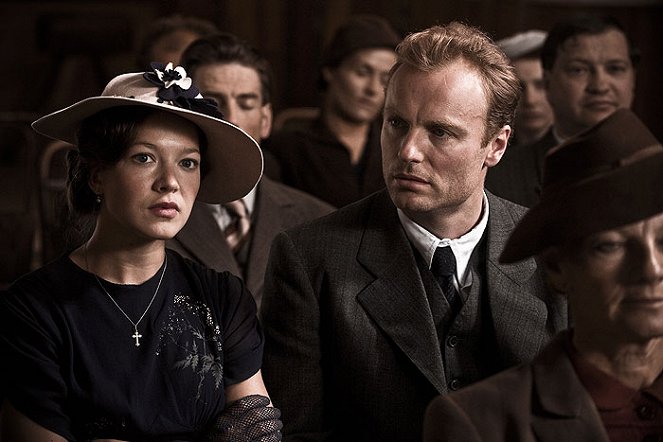Directed by:
Juraj HerzCinematography:
Alexander ŠurkalaComposer:
Elia CmiralCast:
Mark Waschke, Karel Roden, Ben Becker, Hannah Herzsprung, Radek Holub, Wilson Gonzalez Ochsenknecht, Zuzana Kronerová, Jan Hrušínský, Franziska Weisz (more)VOD (1)
Plots(1)
A war drama takes place in a small village in the Sudetenland between 1938 and 1945. A time that made victims murderers and murderers victims for a change. Staying apart and keeping a cool head was the hardest thing to do. (official distributor synopsis)
Videos (1)
Reviews (8)
A very good film, not only by Czech standards. Great actors, Herz's direction supported by excellent cinematography and Cmiral's haunting music, and an interesting story, which is unfortunately quite easy to predict. Habermann's Mill could easily have been a bit longer to give more space to some of the characters (yes, I mean for example Kaiser and Stránský).
()
To tell you the truth, Habermann's Mill was a very pleasant surprise. The craftsmanship is very professional, Roden is charismatic and the emotions are fairly strong. Unfortunately, it has a couple of the typical problems of modern Czech cinema, like some toe-curling dialogues and the terrible post-synchronisation… but the overall impression left by Herz’s film is very positive.
()
Getting to know the characters and the period atmosphere in the first third promises a great drama of Western European quality with Oscar ambitions. This potential, however, somehow fades away during the rest of the film. The writing of the list was supposed to be the key scene of the film that would turn the remaining running time into an unforgettable dramatic inferno. It turned out to be only a partial success. Nevertheless, the film remains very decent – the actors, costumes, set designs and camerawork are all flawless. I thought hard about giving it four stars.
()
People are swine, and it doesn't really matter what their nationality is. The film captures a dark period in human history and also a dark period in Czech history. Yes, Germans were monsters during the war, but after the war, monsters also emerged from other places. Yes, war may be to blame, but perhaps it is also human nature and the attempt to define justice as an eye for an eye when no one is watching. The finale of the film is epically cruel.
()
Certainly the most significant and quite possibly one of Herz's most successful works since his creative heyday (ending with Morgiana). But at the same time, the film, which, compared to last year's Protector, looks terribly old-fashioned with its radical propensity for pathos and television with its conservative processing. It is good, however, that it opens up the painful and still sensitive subject of German expulsion and crimes against often innocent members of another nationality. What is worse is that in its vision of the world, the film remains at times awkward, clenched and pathetic, albeit with an inverted sign (the characters of Czech pigs are basically equivalent to typical film SS soldiers). Habermann's Mill is very good wherever it focuses on the civilian theme (Habermann as a man who wants to stand "outside" ideologies, which is his fatal mistake) and does not embark on the upright waves of tragedy. When it comes to it (Habermann's wife's interview with the Sturmbahnführer, the execution of Czechs, the final scenes of lynching), the film has the old familiar piece of unnaturalness and bony script equations. The dubious choice of language can also be blamed – why on earth are two Germans talking to each other in Czech post-synchronization and with a terrible attempt at a hard German accent? There are a number of unpleasant excesses, but on the other hand Herz can always compensate them with more successful moments, when I felt that this film had something to say, but he never finishes it. His greatest advantage remains quality craftsmanship, sensitive direction, stylish music and, above all, the charismatic Březina performed by Karel Roden, a character who makes Habermann's Mill surprisingly decent here and there. [55.5% :o)]
()



Ads